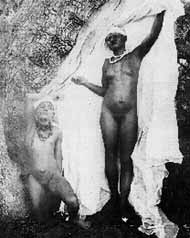    
Sabiana
Regular Poster
Username: Sabiana
Post Number: 159
Registered: 08-2006
Rating: N/A
Votes: 0 (Vote!) | | Posted on Tuesday, July 17, 2007 - 01:56 pm: | 



|
The tribe Germany
wants to forget
Mail&Guardian, March 13, 1998.
In the small, dusty graveyard of Usakos, Adelheid Tjijorokisa-Ndjavera points to headstones marking the graves of her family.
The impressive headstone of Karl-Heinrich Knaeble, born in Oberndorf, Bavaria, and the modest cross of Klara Kozeri Muukua, pla ce of birth unstated, face each other over what used to be the great colonial divide, a rusty barbed-wire fence, that has collapsed allowing both her grandparents to rest within the same place of peace.
"We know the white side of the families here in Na mibia," she says, a frown creasing her light olive complexion. "But they don't want to know anything about us. The local German community is very hostile to us."
An outspoken activist for Herero rights, she is not surprised by this attitude. After all, about two-thirds of her people were killed in Herero uprisings between 1887 and 1907.
The Hereros' quest for reparations from the German government cuts to the heart of the burning land question in Namibia. Unlike the politically dominant Owambo people - who are well-represented in the ruling South West African Peoples Organisation (Swapo) - the Hereros lost most of their grazing areas, now occupied by prosperous white farmers, many of them third-generation German Namibians.
This became a painful political reality for German President Dr Roman Herzog, who visited Namibia last week and is currently in South Africa.
Tjijorokisa-Ndjavera was born of the stolen love between Knaeble and Muukua. But for most of the Herero women subjected to sexual union with German colonials, she asserts, their experience was one of humiliation. "What could they do? All the men were killed, all the land stolen from us and all our cattle either dead or confiscated. They became sex slaves to just survive."
Sexual serfdom: Two adolescent Herero girls posing naked were photographed by a German soldier. PHOTOGRAPH: COURTESY OF JUTTA ANA DOBLER

The German colonial policy of divide and rule saw governor Theodore Leutwein in 1894 recognise Samuel Maherero, fond of drink and prone to selling other people's land, rather than the more traditional Asas Rirua, as successor to Chief Tjamuaha of the Here ros.
The first Herero uprising on March 14 1897 failed, but seven years later, Samuel Maherero, sobered by the land-grabbing of the Germans, rose with his people at Okahandja in May 1904, killing every German farmer and trader they could and seizing 25 000 hea d of cattle.
The reprisals came slowly at first, but increased in swiftness and brutality. Leutwein wanted to preserve the Hereros as a pool of labour. But as German losses mounted, the colonial office of Prince Otto von Bismarck dispatched Lieutant-Ge neral Lothar von Trotha. He delivered quick results with such brutality that Leutwein resigned in protest.
The defeated Hereros fled into the eastern Omaheke desert. But Von Trotha wanted to make an example of them - nothing but annihilation would do.<p>Offering huge bounties for the heads of Maherero and his captains, Von Trotha issued his infamous extermination order on October 2 1904. He warned: "Every Herero found within German borders, with or without guns, with or without livestock, will be shot. I will not give shelter to any Herero women or children. They must return to their people, or they will be shot."
The Herero uprising came to an end soon after this, although mop-up operations continued until 1907. Only a few hundred survived; many mor e were shot as Germans pursued them from waterhole to waterhole.
Thousands of men gave themselves up and were locked in concentration camps in central Namibia and along the coast, where death came more slowly in the form of smallpox, typhus and tubercul osis.
Tjijorokisa-Ndjavera says many Herero women were forced into sexual serfdom as their men died in their thousands. But what grieves her and fellow Herero activist Professor Mberumba Kerina most is that the colonial tactic of divide and rule has be en adopted by the Swapo government and its German aid donors.
When the Hereros tried handing a petition to Herzog at a state banquet last week, the rival Swapo-aligned Mbanderu faction quickly handed up their own petition.
Kerina says Herzog is willi ng to discuss the issue. "Up to now, our experience has been simply of a frozen ocean between us and the German government." But Herzog said too much time has passed for a formal apology to the Hereros to make sense.
He argued that no international leg islation existed at the time under which ethnic minorities could get reparations. Kerina disagrees: under the Fourth Hague Convention of 1899, he says, reprisals against civilians on the losing side were outlawed.
Newspapers last week reported that Herz og was prepared to apologise to the Herero people. But it now seems he may have been misinterpreted - literally. Last weekend, Herzog blamed the furore about German-medium education on an incorrect translation - then publicly fired his translator Christo pher Hain at a press conference when Hain faltered in translating this.
It's too bad a German president did not do the same with Lothar von Trotha.
http://artsci.wustl.edu/~anthro/courses/306/herero.html
|